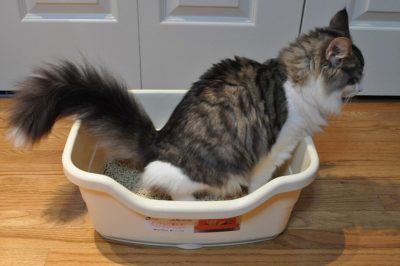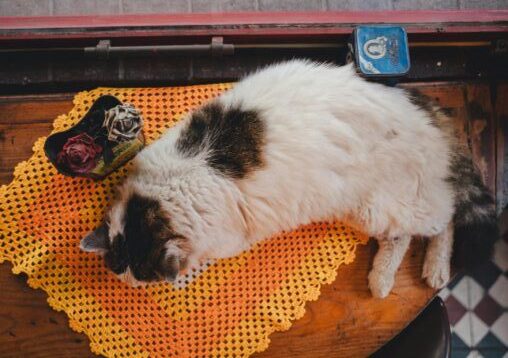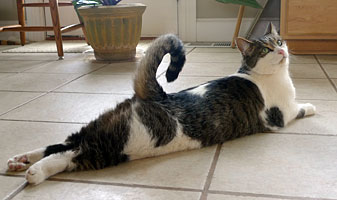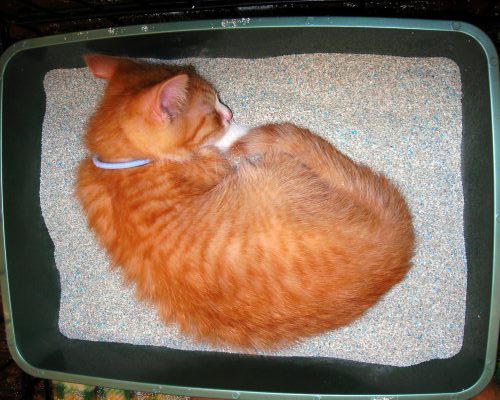
Dealing with a cat that refuses to use the litter box can be both frustrating and challenging. The situation often leads to unpleasant odors, cleaning up accidents, and a lot of confusion about what’s going wrong. But before jumping to conclusions, it’s important to understand the root causes of this behavior. Sometimes, things like catnip can cause cats to pee outside the box—something I learned the hard way. Let’s explore the possible reasons behind your cat’s litter box avoidance and how you can resolve it.
The First Step: Identifying the Cause
When a cat starts urinating outside the litter box, it can stem from two main sources: medical issues or behavioral problems related to their environment. Let’s break down these causes to help you pinpoint the issue.
1. Health Issues Affecting Litter Box Use
If your cat is suddenly avoiding the litter box, there’s a chance it might be due to a health problem. Common culprits include:
- Urinary Tract Infections (UTIs): Cats with UTIs often associate the pain of urinating with the litter box and may begin avoiding it altogether.
- Arthritis: Older cats, especially those with arthritis, may struggle to climb into or out of a standard litter box, causing them to relieve themselves elsewhere. Special litter boxes designed for senior cats are lower and more accessible, making it easier for them to use and improving their comfort.
- Constipation: If your cat is constipated, it may avoid the litter box due to discomfort during elimination.
- Other Medical Issues: Any condition that affects a cat’s ability to comfortably use the litter box—whether it’s due to pain or discomfort—can contribute to accidents.
To rule out any medical concerns, schedule a visit to your vet. It’s essential to address health problems as the first step in solving the issue.

2. Cat’s Personally and Age
A cat’s personality and age are important factors in litter box accidents. A study by Salla Mikkola, Milla Salonen, Emma Hakanen, and Hannes Lohi from the University of Helsinki, involving 3,049 privately owned cats, identified several factors contributing to house soiling. The most influential factors were the cat’s activity level and playfulness, followed by age and the timing of neutering or spaying. Additionally, fearfulness, which can increase when a cat is stressed or unhappy, also plays a significant role in litter box issues.

3. Behavioral Causes: Stress and Unhappiness
An important factor to consider is your cat’s emotional and mental well-being. Cats are creatures of habit and routine, and disruptions in their environment can cause stress, leading to litter box avoidance. Common behavioral triggers include:
- Territorial Anxiety: If your cat feels that its space is being invaded by another pet or a new person, it might start urinating outside the litter box to mark its territory.
- Changes in Environment: A recent move, new furniture, or changes in the owner’s routine can confuse and stress cats, leading to accidents, including cats spraying on beds. These environmental shifts can disrupt their sense of security, causing them to mark their territory in response to anxiety.
- Lack of Cleanliness: Cats are extremely particular about cleanliness. A dirty litter box can be a major turn-off.
- Inadequate Litter Box Setup: A litter box that is too small, too high to enter, or placed in a poorly chosen location can discourage your cat from using it.
To address these concerns, evaluate each one of these points and make adjustments to ensure it feels safe, comfortable, and secure.
3.1 When Territorial Disputes Arise
In multi-cat households, territorial competition can be a significant issue. One cat may refuse to use the litter box to assert dominance or due to conflict with another pet. To identify the culprit, try confining one cat temporarily to see if the issue stops. Alternatively, a vet can help determine which cat is causing the problem using fluorescein, a harmless dye that makes their urine glow under ultraviolet light.
If territorial disputes are the cause, a key solution is to provide separate litter boxes for each cat. The general rule is one litter box per cat, plus one extra. This ensures each cat has their own space and could be a way to reduce cat conflict and agression. Additionally, providing individual food and water bowls, beds, and toys can help maintain harmony. Positive reinforcement, such as offering treats during interactions, can also foster better relationships between cats and minimize territorial behavior.
3.2 Changes in Environment and Marking Behavior
Changes in the cat owner’s routine can disrupt a cat’s environment. Cats are creatures of habit, and shifts in daily activities—like being away for longer periods or altering interaction times—can cause insecurity, possibly leading to avoidance of the litter box or spraying. This behavior is a way for cats to communicate when feeling threatened or anxious. Adding new members to the household, such as a new pet or person, or even spotting another cat through the window, can also trigger similar reactions. In multi-cat households, a cat’s need for space, especially due to dominance, may explain why a cat sleeps in its litter box.
Other environmental factors, such as temperature or humidity in the room where the litter box is placed, can influence a cat’s behavior. Cats may feel uncomfortable in unfavorable conditions, and humidity can intensify odors. To help resolve this, open a window or place an air purifier near the litter box. In humid environments, you should replace the cat litter more often—every 7-10 days works well. The more days between changes, the more often you’ll need to scoop.

3.3 Lack of Hygiene in the Litter Box
A dirty litter box can greatly impact a cat’s well-being. Cats are naturally clean animals and may refuse to use a box that isn’t properly maintained. The presence of urine and feces can lead to stress, anxiety, and even health issues like urinary tract infections. To keep your cat comfortable and prevent unpleasant odors, scoop the litter box at least once a day and clean and replace the litter weekly. If the litter box isn’t cleaned regularly, unsanitary conditions can deter your cat from using it, causing accidents elsewhere in the house. Maintaining a clean litter box is essential for your cat’s health and happiness. If you struggle to keep up with regular cleaning, you may want to consider self-cleaning litter boxes.

3.4 Inadequate Litter Box Setup: When a Cat Doesn’t Like the Litter Box
Sometimes, the issue is simpler: your cat simply doesn’t like the litter box! Cats are picky creatures, and even minor issues can make them avoid the box. Here are common reasons:
- Litter Box Type: Some cats dislike hooded or top-entry boxes. Others may find certain types of litter too uncomfortable.
- Litter-Box Size: A litter box that’s too small can cause stress and discomfort, especially for larger cats, leading them to avoid it. According to AAHA Feline guidelines it’s recommended to choose a box at least one and a half times your cat’s length to allow room to move and dig comfortably. Additionally, ensure there’s enough litter for your cat to bury waste properly. If your cat is avoiding the box, consider upgrading to a larger one.
- Litter Preferences: Cats can be picky about their litter, and preferences vary. Different types, like clumping, non-clumping, or silica gel, offer unique textures and scents. Try offering multiple options to see which your cat prefers, helping encourage consistent litter box use and comfort.
- Accessibility: Litter boxes with high sides or hard-to-reach entries may be a struggle for cats, especially senior ones.
- Location: The litter box location is key to encouraging use. Keep it away from food and water bowls, as cats prefer not to eliminate near eating areas. Place it in a quiet, low-traffic spot where your cat feels safe. For more tips, check out my article on choosing the best location for your cat’s litter box. The aim is privacy, safety, and easy access. In my article Choosing the Location of the Cat’s Litter Box I explain in detail the best ways to accommodate the litter box in your home.
To resolve these issues, consider upgrading to a self-cleaning litter box or a box with low sides for easy access. Experiment with different types of litter to see which one your cat prefers.
Making Your Cat Happier Can Improve the Litter Box Usage
If your cat is showing signs of stress or unhappiness, such as aggressive behavior or avoidance, you need to help alleviate its anxiety. Here are a few strategies:
- Playtime: Dedicate at least 15 minutes each day to playing with your cat. Interactive toys can help relieve stress and redirect its energy.
- Safe Spaces: Provide your cat with hiding spots and high vantage points where it can feel secure and observe its surroundings.
- Scratching Posts: Cats need to scratch to mark their territory and stretch. Provide a good scratching post to help them feel more at ease.
- Hiding Places: Cats love to have their own space to retreat when they feel overwhelmed. Make sure they have areas where they can relax without interruption.
- Territorial Boundaries: If you have multiple pets, each should have its own designated space. This includes separate food and water bowls, as well as sleeping areas.
For a cat that’s feeling stressed by external factors (like a neighbor’s cat), blocking the view of the window or providing an alternative vantage point can help ease their anxiety. If you have other pets like dogs, make sure they can’t access your cat’s space. For example, finding ways to stop the dog from eating the cat’s food is a very good start.
Don’t Give Up!
It can be disheartening when your cat refuses to use the litter box, especially if it’s causing stress at home. However, it’s important to remember that this behavior often stems from a deeper issue, whether health-related or emotional. Once the root cause is identified and addressed, your cat will likely return to its litter box habits.
If you’re unable to figure out the issue on your own, consider consulting an animal behaviorist for professional guidance. With patience and attention, you can solve this problem and ensure your cat’s well-being and happiness.
Wow. I never had an inside cat so it wasn’t a problem. We had ton’s of cats on the farm but they were pretty much on their own. Our daughter has two cats and has had a few problems. I’ll pass this along to her
That is a good idea John, especially if she has two cats.
fussy little things sometimes aren’t they?
Yes, they are Dominic, that’s for sure!